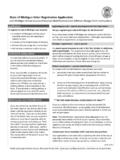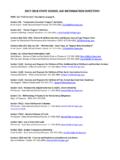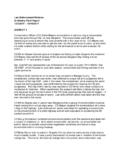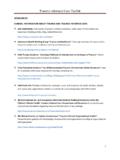Transcription of Families First of Michigan
1 Families First of Michigan Successfully working to Keep Families Together Safely A Program of the Michigan Department of Human Services in partnership with Private Child Welfare Agencies Program Guidelines Department of Human Services Ismael Ahmed, Director 235 S. Grand Avenue, Suite 510 Box 30037 Lansing, Michigan 48909 Table of Contents Philosophy Page 3 Domestic Violence Philosophy 4 Values and Beliefs 5 Program Characteristics 6 Guidelines: General Eligibility Risk Factors 7 Guidelines: Appropriate and Inappropriate Referrals 10 Guidelines: Neglect 12 Guidelines: Physical Abuse 14 Guidelines: Substance Use Affect Child and Household Management 15 Guidelines: Family Violence 16 Guidelines: Mental Health 17 Guidelines.
2 Physical Illness or Limitation 18 Guidelines: Sexual Abuse 19 Guidelines: Domestic Violence Program 21 Guidelines: Family Reunification/Foster Care 23 Guidelines: Post-Adoption Families 25 Guidelines: Juvenile Justice 27 Guidelines: American Indian 29 Guidelines: Re-Referrals 30 Guidelines: Exceptions For Services 31 Child Protection Law: Section 8d: Category Information 32 Revised 4-9-10, Previous Versions Obsolete Page 2 Families First of Michigan Philosophy CHILDREN HAVE A RIGHT TO THEIR FAMILY. THE FAMILY IS THE FOCAL POINT OF CHILD WELFARE SERVICES. OUR First AND GREATEST INVESTMENT IS FOR THE CARE AND TREATMENT OF CHILDREN IN THEIR OWN HOMES. THE FAMILY IS THE FUNDAMENTAL RESOURCE FOR THE NURTURING OF CHILDREN. parents SHOULD BE SUPPORTED IN THEIR EFFORTS TO CARE FOR THEIR CHILDREN.
3 IT IS IN THE BEST INTEREST OF CHILDREN TO REMAIN WITH THEIR Families IN THE ABSENCE OF COMPELLING EVIDENCE TO THE CONTRARY. Families ARE DIVERSE AND HAVE A RIGHT TO BE RESPECTED FOR THE UNIQUE CULTURAL, RACIAL, ETHNIC, AND RELIGIOUS TRADITIONS THAT MAKE Families DISTINCT. CHILDREN CAN BE RAISED WELL IN DIFFERENT KINDS OF Families AND NO FAMILY SHOULD BE DISCRIMINATED AGAINST IN FAVOR OF ANOTHER. Revised 4-9-10, Previous Versions Obsolete Page 3 Families First of Michigan Domestic Violence Philosophy CHILDREN HAVE A RIGHT TO A VIOLENCE-FREE FAMILY. DOMESTIC VIOLENCE HAS DEVASTATING EFFECTS ON VICTIMS, CHILDREN AND SOCIETY. EMPOWERMENT OF SURVIVORS COMBINED WITH SOCIAL/LEGAL CHANGE AND INTERVENTION PROGRAMS FOR THE OFFENDING PARENT IS NEEDED TO PROVIDE A VIOLENCE-FREE HOME FOR THE FAMILY. SURVIVORS NEED ACCESS TO SAFETY INFORMATION ABOUT DOMESTIC VIOLENCE, INCLUDING THEIR LEGAL RIGHTS, AVAILABLE SERVICES AND COMMUNITY SUPPORT.
4 SURVIVORS MUST BE TREATED WITH DIGNITY AND RESPECT AS WELL AS PROVIDED WITH SUPPORT AND ADVOCACY. IT IS IN THE BEST INTEREST OF CHILDREN TO SUPPORT THE NON-OFFENDING PARENT/CAREGIVER THE BOND BETWEEN THE NON-OFFENDING PARENT/CAREGIVER AND THE CHILDREN NEEDS TO BE ENHANCED AND STRENGTHENED. Revised 4-9-10, Previous Versions Obsolete Page 4 Families First of Michigan Values and Beliefs** SAFETY IS OUR First CONCERN CHILDREN NEED Families WE CANNOT TELL WHICH Families ARE HOPELESS TROUBLED Families CAN CHANGE CLIENTS ARE OUR COLLEAGUES RESPECT OUR CLIENTS VALUES AND BELIEFS IT IS OUR JOB TO INSTILL HOPE A CRISIS IS AN OPPORTUNITY FOR CHANGE INAPPROPRIATE INTERVENTION CAN DO HARM **Values and Beliefs Adapted from BSI Homebuilders, Federal Way, WA Revised 4-9-10, Previous Versions Obsolete Page 5 Families First of Michigan Program Characteristics FOCUS ON FAMILY STRENGTHS TO ADDRESS WEAKNESSES.
5 LIMITED TO CHILDREN AT IMMINENT RISK OF REMOVAL FROM THEIR HOME. IMMEDIATE RESPONSE (WITHIN 24 HOURS) FLEXIBLE SCHEDULING (24 HOURS, 7 DAYS/WEEK) SMALL CASELOADS (2 Families /WORKER) INTENSIVE INTERVENTION (10-20 HOURS/WEEK, AS NEEDED) SERVICES DELIVERED IN CLIENTS HOME AND COMMUNITY TIME LIMITED (4 WEEKS WITH THE POSSIBILITY OF AN EXTENSION UP TO A MAXIMUM OF 6 WEEKS) HARD AND SOFT SERVICES DELIVERED BY A SINGLE WORKER ECOLOGICAL APPROACH (WORKS WITH FAMILY AND COMMUNITY INTERACTION) GOAL ORIENTED WITH LIMITED OBJECTIVES SPECIFIC ASSITANCE FUNDS AVAILABLE EVALUATION/FOLLOW-UP Revised 4-9-10, Previous Versions Obsolete Page 6 GENERAL ELIGIBILITY GUIDELINES FOR MAKING REFERRALS TO Families First OF Michigan RISK FACTORS CHILDREN'S PROTECTIVE SERVICES (CPS) The main criterion for referring parent(s)/caregiver(s) to Families First of Michigan (FFM) is the risk factor.
6 Risk is defined as any condition or set of conditions that pose an immediate threat to a child s and/or community s safety that would likely result in out-of-home placement. Parent(s)/caregiver(s) may be eligible for FFM services if at least one child residing in the home is at imminent risk of placement in out-of-home care due to child abuse or child neglect and CPS has determined the case to be a category disposition I or II. DOMESTIC VIOLENCE (DV) PROGRAM REFERRALS FROM IDENTIFIED DOMESTIC VIOLENCE SHELTERS Specific FFM contracts are identified to accept referrals from domestic violence (DV) shelters. Referrals to FFM are limited to those Families that include a parent or guardian (survivor of DV) and at least one child under 18 years of age. For the referral to FFM due to DV, the term "risk" refers to risk of homelessness due to DV, living in a potentially violent environment, or other risks to a child's welfare.
7 Families receiving residential or non-residential DV services may be referred. Suspected abuse and neglect of children while living in DV shelters should be referred to CPS. This should occur before any referral to FFM is considered. To prevent simultaneous referrals, if there is an active CPS, foster care and/or delinquency case, a referral from a DV shelter advocate would only be appropriate with consultation and agreement of the DHS worker. This should prevent duplication of services from CPS, foster care, delinquency or DV for a family. Note: If CPS is working with the parent/caregiver for DV the referral is not considered a DV referral unless the referral is made by a DV shelter and the FFM agency has the DV component in their contract. REUNIFICATION REFFERALS FROM DHS FOSTER CARE Parent(s)/caregiver(s) with children in out-of-home care are eligible for referral to the program when it is determined that reunification is not appropriate without intensive services and the Family Reunification Program (FRP) is not available.
8 Foster care reunification referrals must come from DHS foster care. For all other reunification referrals, a Family Preservation Specialist s approval is needed prior to the FFM agency accepting the referral. Note: Private agencies cannot make referrals to FFM. Revised 4-9-10, Previous Versions Obsolete Page 7 JUVENILE JUSTICE REFFERALS FROM DHS JUVENILE JUSTICE SPECIALISTS Juvenile justice referrals are limited to those youth who are being served by Department of Human Services (DHS). A DHS juvenile justice specialist (JJS) may make a referral to the FFM agency if the youth is at imminent risk of being placed in long-term out-of-home placement due to delinquency or incorrigibility. AMERICAN INDIAN REFERRALS FROM TRIBAL SOCIAL SERVICES The main criterion for referring parent(s)/caregiver(s) to Families First of Michigan (FFM) is the risk factor.
9 Risk is defined as any condition or set of conditions that pose an immediate threat to a child s and/or community s safety that would likely result in out-of-home placement. Parent(s)/caregiver(s) may be eligible for FFM services if at least one child residing in the home is at imminent risk of placement in out-of-home care due to child abuse or child neglect. NOTE: Specific FFM contracts are identified to accept referrals from American Indian Social Services when the FFM agency has a tribal component in their DHS contract for FFM services. POST-ADOPTION PROGRAM REFERRALS Adoption program referrals are limited to those Families that are being served by the Department of Human Services (DHS) in collaboration with private agency post adoption services A DHS adoption worker may make a referral if the adoption has been finalized and the adopted child is at risk of being placed in long term placement out of the adoptive home, or if the adoption is at risk of dissolution.
10 For all post-adoption referrals a Family Preservation Specialist s approval is needed prior to the FFM agency accepting the referral. FOR ALL REFERRALS 1. The parent(s)/caregiver(s) will have direct access to the FFM worker 24 hours a day, 7 days a week, including weekends and holidays. 2. A FFM worker will provide an immediate response (within 24 hours) to the parent/caregiver with the assurance that a worker will be able to access emergency services as appropriate. 3. The FFM worker will spend an average of 10-20 hours per week with the family beginning on the day of the referral. 4. The FFM intervention is time-limited (4 weeks with the possibility of an extension up to a maximum of 6 weeks). Extensions up to 6 weeks will be considered if the risk to the child still exists, placement is imminent and the family has goals to achieve.















